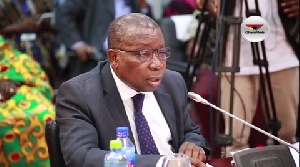 Minister of Health, Kwaku Agyeman Manu
Minister of Health, Kwaku Agyeman Manu
The maiden National Maternal, Child Health and Nutrition (MCHN) Conference, on Tuesday opened in Accra, to map out strategies to decrease disparities in health services delivery, and increase Universal Health Coverage (UHC) by ensuring accountability.
The three-day conference, which also seeks to create a platform to increase partner involvement and knowledge sharing, was on the theme: “Strengthening Partnerships for achieving Universal Health Coverage in Reproductive Maternal, Child, Adolescent Health and Nutrition”.
The occasion was graced by the presence of the First Lady, Mrs Rebecca Akufo-Addo, who delivered the keynote address, and also brought together health sector partners and all key stakeholders including traditional leaders.
Mr Kwaku Agyeman Manu, the Minister of Health, in address, commended the Ghana Health Service (GHS) and its Partners for hosting the conference and the continuous engagement to improve health sector outcomes.
He admitted that the country’s maternal child health and nutrition, had evolved over the years, evidently in the incremental improvement recorded with regards to access and quality of services, particularly for mothers, children and adolescents.
However, in spite of the significant progress in many health indicators, the prevailing levels of maternal and child illnesses and deaths were simply too high, and in most cases preventable.
He said to achieve Universal Health Coverage as stated in the target three of the Sustainable Development Goal (SDG), there must be a deliberate and sustained efforts to invest in maternal and child health, which presented both short and long term benefits vital to the development of the country.
“Consequently, households with healthier and better nourished mothers and children spend less on healthcare. Reducing unexpectedly large and catastrophic out-of-pocket expenses for this vulnerable group is particularly important”, he said.
Mr Agyeman Manu said the government was committed to ensuring a robust health insurance system, as well as develop and implement policies such as the free maternal health care services, to benefit women and children.
Further, government was working tirelessly to ensure equitable distribution of a competent health force and improve the health infrastructure, as well as institute measures to strengthen the primary health care system through the expansion of Community-based Health Planning and Services (CHPS) programme, which continued to receive massive investments from both government and its partners.
“These are all towards building a resilient community health system that meets the health care needs of women and children”, he said.
He said government would continue to make issues of maternal and child mortality a priority and continue to commit more resources to address the challenges.
Mr Agyeman Manu made a personal commitment to increase focus on building the capacity and fair distribution of frontline service providers and specialists in maternal and child health across the country.
He called for the institutionalisation of the conference, and challenged the participants to come out with innovative, comprehensive and home grown strategies to improve on maternal child health and nutrition in the country.
Dr Patrick K. Aboagye, the Director of Family Health, GHS, in an overview of the Reproductive, Maternal, Newborn, Child, Adolescent Health and Nutrition situation, said current statistics showed a downward trend in the total fertility rate.
However, anaemia among pregnant women and young adolescent girls were still high, attributing this to the regional disparities in their nutritional status, and stated that progress had been made to screen about 300,000 school girls and administer iron supplements to address the challenge.
“Maternal mortality, especially institutional maternal mortality”, he said, was also still high, and called for the establishment of regional model health facilities to provide comprehensive care including immediate blood transfusion to save the lives of pregnant women referred from the primary health care level.
Dr Anthony Nsiah Asare, the Director-General of the GHS, called for the need to review the sectors’ programmes premised on accountability, address the nutrition gaps between the northern and southern sectors of the country, and support for the Service’s technology drive to improve data.
Mr Niyi Ojuolape, the UNFPA Country Representative, on behalf of the development partners, expressed contentment for Ghana’s sustained focus on achieving UHC, by ensuring access to quality health care.
He however, said although Ghana had come a long way in its efforts to achieve UHC, there were still challenges in terms of disparities in geographical areas, age, sex and data, as well as inequities in health service delivery, with special emphasis on early childhood development including nutritional issues of children below the ages of five years.
He called for the development of the accompanying legal frameworks to make the Nutritional Policy more functional, and also strengthening programmes to reach out to the unreached population, including adolescents with family planning needs.